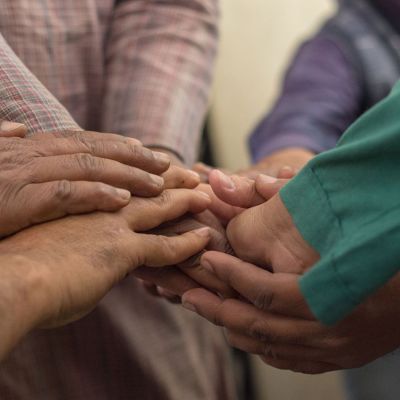Written by Tony Chan (Senior Communications Officer)
Scriptures reading:
12Just as a body, though one, has many parts, but all its many parts form one body, so it is with Christ. 13For we were all baptized by one Spirit so as to form one body—whether Jews or Gentiles, slave or free—and we were all given the one Spirit to drink. 14Even so the body is not made up of one part but of many.
15Now if the foot should say, “Because I am not a hand, I do not belong to the body,” it would not for that reason stop being part of the body. 16And if the ear should say, “Because I am not an eye, I do not belong to the body,” it would not for that reason stop being part of the body. 17If the whole body were an eye, where would the sense of hearing be? If the whole body were an ear, where would the sense of smell be? 18But in fact God has placed the parts in the body, every one of them, just as he wanted them to be. 19If they were all one part, where would the body be? 20As it is, there are many parts, but one body.
21The eye cannot say to the hand, “I don’t need you!” And the head cannot say to the feet, “I don’t need you!” 22On the contrary, those parts of the body that seem to be weaker are indispensable, 23and the parts that we think are less honorable we treat with special honor. And the parts that are unpresentable are treated with special modesty, 24while our presentable parts need no special treatment. But God has put the body together, giving greater honor to the parts that lacked it, 25so that there should be no division in the body, but that its parts should have equal concern for each other. 26If one part suffers, every part suffers with it; if one part is honored, every part rejoices with it.
12Just as a body, though one, has many parts, but all its many parts form one body, so it is with Christ. 13For we were all baptized by one Spirit so as to form one body—whether Jews or Gentiles, slave or free—and we were all given the one Spirit to drink. 14Even so the body is not made up of one part but of many.
15Now if the foot should say, “Because I am not a hand, I do not belong to the body,” it would not for that reason stop being part of the body. 16And if the ear should say, “Because I am not an eye, I do not belong to the body,” it would not for that reason stop being part of the body. 17If the whole body were an eye, where would the sense of hearing be? If the whole body were an ear, where would the sense of smell be? 18But in fact God has placed the parts in the body, every one of them, just as he wanted them to be. 19If they were all one part, where would the body be? 20As it is, there are many parts, but one body.
21The eye cannot say to the hand, “I don’t need you!” And the head cannot say to the feet, “I don’t need you!” 22On the contrary, those parts of the body that seem to be weaker are indispensable, 23and the parts that we think are less honorable we treat with special honor. And the parts that are unpresentable are treated with special modesty, 24while our presentable parts need no special treatment. But God has put the body together, giving greater honor to the parts that lacked it, 25so that there should be no division in the body, but that its parts should have equal concern for each other. 26If one part suffers, every part suffers with it; if one part is honored, every part rejoices with it.
In 1 Corinthians 12, Paul emphasises the diverse nature of the spiritual gifts given by the Holy Spirit, affirming the value of believers with different gifts by using the metaphor of the body. Just as a body needs all its parts to function properly, the Christian community also needs the participation of believers with versatile gifts to accomplish the kingdom of the Lord.
In the metaphor, Paul utilises four pairs of body parts: ‘the hand and the foot’, ‘the eye and the ear’, ‘the eye and the hand’, and ‘the head and the feet’ and assigns them dialogues. In the first two pairs, the foot and the ear compare themselves to what appears ‘more important’ – the hand and the eye, expressing their belief that they are inferior and do not belong to the body. And in the latter two pairs, the eye and the head, considering themselves ‘more significant’, dismiss those who appear ‘subordinates’ by saying: ‘I don’t need you.’
Paul vividly depicts two attitudes often observed within a community: arrogance and self-deprecation. Individuals with lesser gifts tend to compare themselves to others, leading to doubt about and denial of their own value. Meanwhile, those with greater gifts often exhibit tendencies to despise and dismiss others.
And what the Lord desires is ‘there are many parts, but one body’ (v.20). As a part of a community, no one could leave or seek to exclude one another based on the abundance or scarcity of gifts. The scriptures further instruct those with greater gifts: ‘the parts that we think are less honorable we treat with special honor. And the parts that are unpresentable are treated with special modesty … giving greater honor to the parts that lacked it, so that there should be no division in the body, but that its parts should have equal concern for each other.’ (v.23-25)
While this passage’s teachings are directed at a community of believers, we extend the spirit of caring for one another beyond the boundaries of faith. Ultimately, in the eyes of the Lord, everyone is cherished as His precious child.
Residing in a prosperous city with ample resources, we parallel the analogy of the eye and the head in Paul’s metaphor. Being body parts seemingly more capable, we must embrace the lesson of humility. Aside from refraining from dismissing others, a humble person also appreciates the importance of prioritising others’ needs over their own. Shifting our focus away from ourselves enables us to notice others – many ‘unpresentable’ impoverished individuals who are, metaphorically, parts of our collective body. While they may become self-deprecating as poverty deprives them of dignity, they remain integral parts of the unified body.
All body parts in a body share the same empathy: when the poor endure hardship, we suffer; when they receive assistance, we rejoice. The beauty of the term ‘body parts’ in Christian communities lies in our unity as one body, without division, and having equal concern for each other. May all believers genuinely care for the impoverished body parts.
ARTICLES OF THIS ISSUE
Written by Clara Chiu (Head of Partnership Development) Over the past 30 years, CEDAR has continued to support poverty…
Written by Tony Chan (Senior Communications Officer) Scriptures reading: 1 Corinthians 12:12-26 12Just as a body, thou…
Written by Clara Chiu (Head of Partnership Development) I know Queenie through a marathon event. This year, CEDAR has …
Written by Ken Wong (Communications Officer) This year, CEDAR Fund participated in the ‘Marathon Charity Programme’ to…






